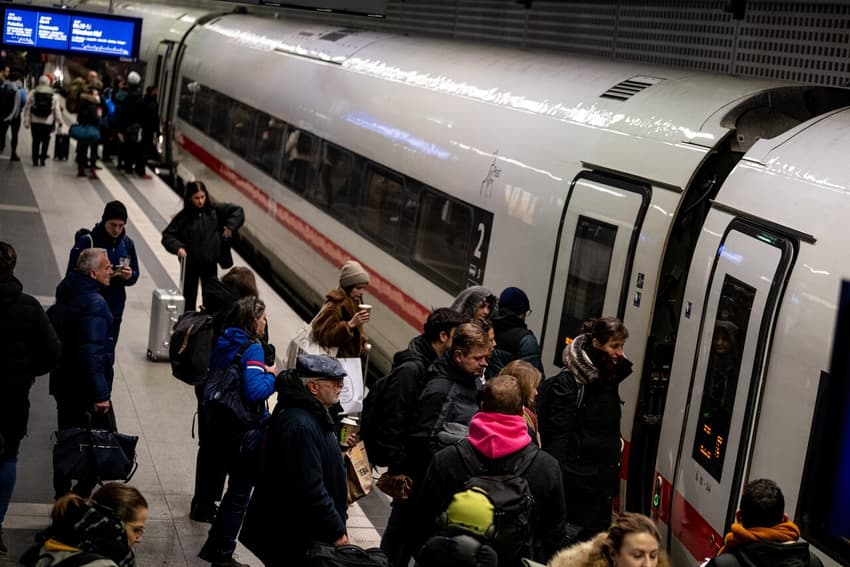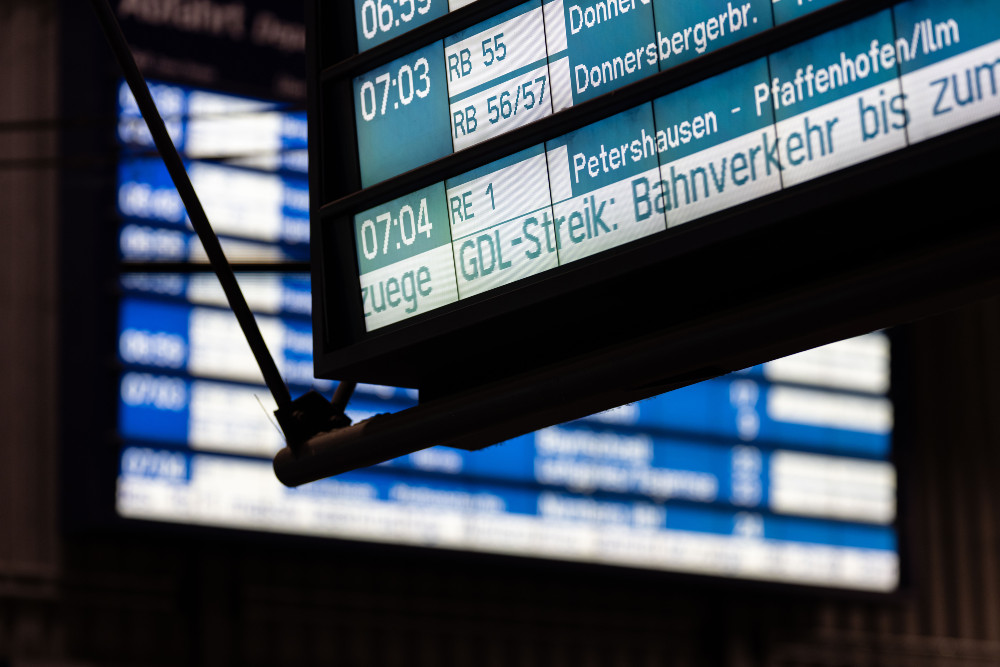How Germany's latest train strike could affect your travel plans

Travel on Germany's long-distance and regional trains will be heavily affected later on Thursday and all-day Friday as a train drivers' strike gets underway.
What's happening?
After negotiations between the German Train Drivers' Union (GDL) and Deutsche Bahn failed, the GDL announced a fresh 'warning strike' on Wednesday.
From 10pm on Thursday, large parts of long-distance and regional rail passenger trains will come to a standstill for 24 hours as many train drivers stage a walkout.
The strike on freight transport will begin at 6pm on Thursday.
Taking in the strikes by rival railway and transport union EVG, this is the fourth time this year that passengers have had to prepare for far-reaching restrictions on the rail network caused by industrial action - not counting weather-related disruption.
Which transport is affected?
All employees in the long-distance and regional transport sectors, including S-Bahn services, have been called out on strike.
According to the union, the strike will not only affect services run by Deutsche Bahn.
Other railway companies such as the Transdev Group (including Bayerische Oberlandbahn and NordWestBahn) are affected.
Huge disruption is therefore to be expected in long-distance, regional and freight transport.
Around one in five ICE and IC long-distance trains were cancelled during the previous GDL strike.
The impact on regional transport varied greatly depending on the region. The GDL mainly represents train drivers and train crews on Deutsche Bahn.
Train dispatchers, who coordinate train services nationwide, have also been called out on the warning strike. However, the GDL is not strongly represented among them.
Which regions are affected?
The strike is taking place across Germany, with the number of services affected depending on how many drivers take part in the industrial action.
Experience has shown that many employees are members of the GDL union, particularly in the eastern German states and in the south-west.
In many places, regional transport services are therefore likely to be cancelled.
The GDL also has lots of members in Stuttgart and Frankfurt. In both cities, suburban railway services are likely to be hit hard.
In the north-west of the country the union is less well represented.

A sign in Munich announcing the previous train drivers' strike in November. Photo: picture alliance/dpa | Lukas Barth
The official start of the warning strike for passenger services is Thursday at 10pm. However, passengers may face train cancellations and delays in the hours beforehand.
During the previous strikes, Deutsche Bahn tried to park the trains where they would be needed after the action. According to the GDL, the industrial action will last until 10pm on Friday. But disruption often lasts for some time after the end-time as services try to get back to normal.
Where can I find out about my train?
You can usually find out whether a long-distance or regional train is running or not via the Bahn app or the Deutche Bahn site. DB also set up a free strike hotline on 08000 99 66 33 on Thursday morning.
If you want to be on the safe side, don't go to the station at all: Deutsche Bahn is asking passengers to avoid non-essential journeys during the strike or to postpone the journey.
One thing worth keeping in mind is that services such as U-Bahn and bus services are not affected so if you can take alternative travel, go for that.
Is there an emergency timetable?
Yes, as in the previous strike, Deutsche Bahn will offer an emergency timetable for long-distance services with a reduced number of journeys.
What happens to my ticket?
If you want to postpone your long-distance train journey because of the strike, you can use your ticket at a later date.
Note that your ticket is also valid for the original destination, even if you take a different route. Seat reservations can be cancelled free of charge.
Passengers also have the option of bringing their journey forward and travelling on Thursday. For that reason services are likely to be more busy than usual.
If it is clear that a train will be cancelled, the ticket can also be cancelled free of charge and the money refunded in the form of a voucher or as a payment.
If you face delays you can also be partly reimbursed for your ticket in many cases.
READ ALSO: How to get compensation for a delayed or cancelled train in Germany
Why is the strike taking place?
The warning strikes are because an agreement hasn't been reached between the union and employer on wages and conditions.
The GDLs core demand is for working hours to be reduced to 35 hours a week, from 38 currently, without salaries being cut.
The union is also seeking a €555 a month salary increase, and a tax-free, €3,000 bonus to deal with inflation. This agreement would run for 12 months, with more negotiations to follow after that.
Deutsche Bahn has offered an 11 percent pay increase as well an inflation bonus of up to €2,850, but has refused to reduce working hours.
Earlier this year, a series of strikes by a larger transport union, EVG, on the rail network caused widespread disruption.
Will there be more strikes?
Possibly. There's no way of predicting how negotiations will continue.
As The Local has reported, the GDL is in the process of balloting its members on introducing unlimited strikes.
READ ALSO: German train drivers' union ballot on unlimited strikes
Unlike warning strikes, this type of industrial action does not have to be capped at few days and can continue indefinitely until a solution is found.
However, one thing to note is that the GDL has ruled out carrying out strikes over Christmas.
Comments
See Also
What's happening?
After negotiations between the German Train Drivers' Union (GDL) and Deutsche Bahn failed, the GDL announced a fresh 'warning strike' on Wednesday.
From 10pm on Thursday, large parts of long-distance and regional rail passenger trains will come to a standstill for 24 hours as many train drivers stage a walkout.
The strike on freight transport will begin at 6pm on Thursday.
Taking in the strikes by rival railway and transport union EVG, this is the fourth time this year that passengers have had to prepare for far-reaching restrictions on the rail network caused by industrial action - not counting weather-related disruption.
Which transport is affected?
All employees in the long-distance and regional transport sectors, including S-Bahn services, have been called out on strike.
According to the union, the strike will not only affect services run by Deutsche Bahn.
Other railway companies such as the Transdev Group (including Bayerische Oberlandbahn and NordWestBahn) are affected.
Huge disruption is therefore to be expected in long-distance, regional and freight transport.
Around one in five ICE and IC long-distance trains were cancelled during the previous GDL strike.
The impact on regional transport varied greatly depending on the region. The GDL mainly represents train drivers and train crews on Deutsche Bahn.
Train dispatchers, who coordinate train services nationwide, have also been called out on the warning strike. However, the GDL is not strongly represented among them.
Which regions are affected?
The strike is taking place across Germany, with the number of services affected depending on how many drivers take part in the industrial action.
Experience has shown that many employees are members of the GDL union, particularly in the eastern German states and in the south-west.
In many places, regional transport services are therefore likely to be cancelled.
The GDL also has lots of members in Stuttgart and Frankfurt. In both cities, suburban railway services are likely to be hit hard.
In the north-west of the country the union is less well represented.

The official start of the warning strike for passenger services is Thursday at 10pm. However, passengers may face train cancellations and delays in the hours beforehand.
During the previous strikes, Deutsche Bahn tried to park the trains where they would be needed after the action. According to the GDL, the industrial action will last until 10pm on Friday. But disruption often lasts for some time after the end-time as services try to get back to normal.
Where can I find out about my train?
You can usually find out whether a long-distance or regional train is running or not via the Bahn app or the Deutche Bahn site. DB also set up a free strike hotline on 08000 99 66 33 on Thursday morning.
If you want to be on the safe side, don't go to the station at all: Deutsche Bahn is asking passengers to avoid non-essential journeys during the strike or to postpone the journey.
One thing worth keeping in mind is that services such as U-Bahn and bus services are not affected so if you can take alternative travel, go for that.
Is there an emergency timetable?
Yes, as in the previous strike, Deutsche Bahn will offer an emergency timetable for long-distance services with a reduced number of journeys.
What happens to my ticket?
If you want to postpone your long-distance train journey because of the strike, you can use your ticket at a later date.
Note that your ticket is also valid for the original destination, even if you take a different route. Seat reservations can be cancelled free of charge.
Passengers also have the option of bringing their journey forward and travelling on Thursday. For that reason services are likely to be more busy than usual.
If it is clear that a train will be cancelled, the ticket can also be cancelled free of charge and the money refunded in the form of a voucher or as a payment.
If you face delays you can also be partly reimbursed for your ticket in many cases.
READ ALSO: How to get compensation for a delayed or cancelled train in Germany
Why is the strike taking place?
The warning strikes are because an agreement hasn't been reached between the union and employer on wages and conditions.
The GDLs core demand is for working hours to be reduced to 35 hours a week, from 38 currently, without salaries being cut.
The union is also seeking a €555 a month salary increase, and a tax-free, €3,000 bonus to deal with inflation. This agreement would run for 12 months, with more negotiations to follow after that.
Deutsche Bahn has offered an 11 percent pay increase as well an inflation bonus of up to €2,850, but has refused to reduce working hours.
Earlier this year, a series of strikes by a larger transport union, EVG, on the rail network caused widespread disruption.
Will there be more strikes?
Possibly. There's no way of predicting how negotiations will continue.
As The Local has reported, the GDL is in the process of balloting its members on introducing unlimited strikes.
READ ALSO: German train drivers' union ballot on unlimited strikes
Unlike warning strikes, this type of industrial action does not have to be capped at few days and can continue indefinitely until a solution is found.
However, one thing to note is that the GDL has ruled out carrying out strikes over Christmas.
Join the conversation in our comments section below. Share your own views and experience and if you have a question or suggestion for our journalists then email us at [email protected].
Please keep comments civil, constructive and on topic – and make sure to read our terms of use before getting involved.
Please log in here to leave a comment.